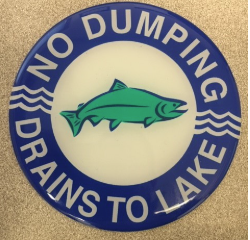The number one pollution threat to Puget Sound is stormwater runoff containing trash, chemicals and heavy metals. When it rains on campus, the rainwater runs into a network of storm drains that lead directly into local bodies of water.
Along the way, rainwater picks up contaminants, such as cigarette butts, pet waste, oil and garbage, which goes untreated and flows directly into fish and wildlife habitat.
Stormwater pollution is rainwater contaminated with bacteria, toxic chemicals, oil, dirt and trash that flows through storm drains into local waterways.
- On the UW Seattle campus, polluted stormwater flows untreated into Portage Bay.
- At UW Bothell, polluted stormwater flows untreated into Lake Washington.
- At UW Tacoma, polluted stormwater flows untreated into the Puyallup River.
Impacts of pollution on natural habitats
Polluted stormwater may contain high levels of contaminants, such as heavy metals, bacteria, toxins, trash and other harmful substances that rob fish and wildlife of oxygen and essential nutrients. Toxic pollutants in stormwater flowing into Portage Bay salmon habitat has contributed to a severe reduction in the number of adult Coho salmon that are able to reproduce.
In addition to damaging salmon habitat, stormwater pollution can:
- Contaminate swimming areas
- Pollute shellfish beds
- Contaminate the groundwater you drink
- Contribute to toxic chemicals in the food chain
Stormwater runoff picks up bacteria, oil and other pollutants that become deadly to salmon and Orcas.
VIDEO: Why is stormwater runoff a problem?
Watch the Solving Stormwater video by Nature Conservancy and Washington State University, featuring Jenifer McIntyre.
You can prevent stormwater pollution
Be a good steward of the environment and protect our waterways by:
- Putting cigarette butts, pet waste and other trash into the garbage
- Properly disposing of paint, cooking oil and grease
- Avoiding the spread of chemicals, fertilizers and insecticides outdoors
Read additional guidance for preventing stormwater pollution.
Report spills
A spill is a release of a substance that may cause harm to the natural environment. The sooner a spill is reported, the quicker it can be addressed, resulting in less harm.
If you see a spill on a University campus, call 206.543.0467 (after hours call 9-1-1).
- Anyone can anonymously report a potential environmental issue at www.ehs.washington.edu/report-concern.
- You can take a photo and send it to chmwaste@uw.edu.
EH&S will respond to and investigate reports in accordance with applicable regulations and policies. There is no penalty for reporting a spill.
Stormwater pollution prevention on campus
The University strives to be good environmental stewards and adhere to local, state and federal regulations.

Stormwater drains on the UW campus are marked with the words “NO DUMPING - DRAINS TO LAKE” as a reminder to avoid contaminating the water that runs directly to local water bodies.
The University is investing in green stormwater filtration to reduce the amount of stormwater that flows directly into drains. Green stormwater filtration provides opportunities for natural filtration of collected rainwater on campus before flowing into storm drains.
Construction projects must minimize storm water pollution. The biggest pollution concerns for construction projects are settleable solids (mainly sediment) and pH. Temporary construction permits should be expected. Depending on the size of the project, permanent storm water detention or treatment may be required.
EH&S maintains a Stormwater Management Plan for the Seattle campus, UW Bothell and UW Tacoma. Read and give your feedback on the plans for protecting stormwater quality on campus.
